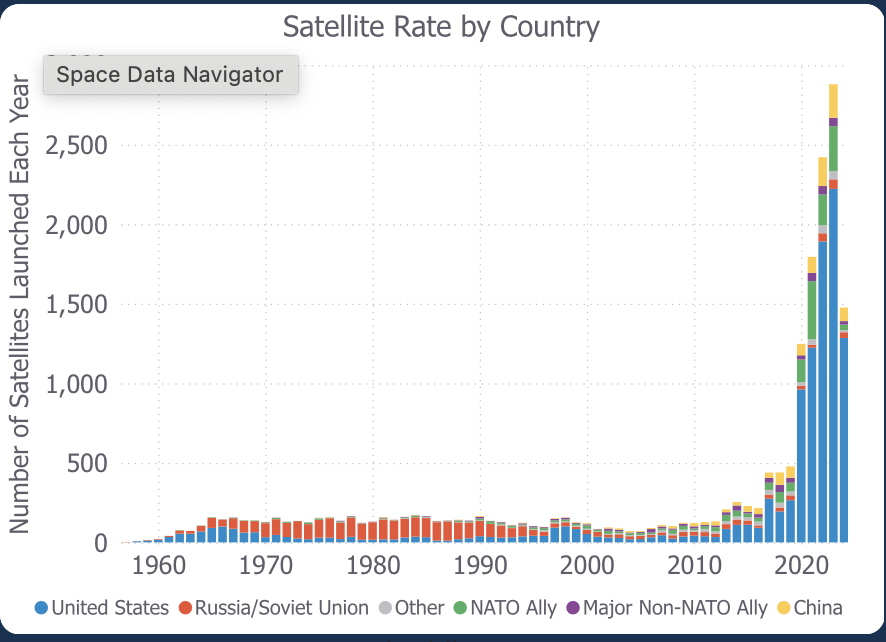The acceleration of commercial, military and scientific space activities in recent years has been astonishing. Technology has evolved to point where space-based activities are demonstrably very lucrative. Satellites in low earth orbit are increasing exponentially (really, see chart below). Launch costs have plummeted and capabilities for small cheap commercial satellites have grown (communications and commercial earth observation in particular). A recent McKinsey /World Economic Forum Report estimated the market for space to be $1.8 trillion in 2035 (https://www.mckinsey.com/industries/aerospace-and-defense/our-insights/space-the-1-point-8-trillion-dollar-opportunity-for-global-economic-growth).

(Chart from AEI Space Navigator[1])
SpaceX has led this incredible growth. According to astronomer Jonathan McDowell, SpaceX CEO, Elon Musk has launched 6281 Starlink satellites for just his commercial broadband service (as of 6 August 2024 see https://planet4589.org/space/con/star/stats.html)[2] But this commercial enterprise will shortly be joined by Amazon’s Kuiper network and Eutelsat’s OneWeb network.
More importantly, and inevitably, at least two Chinese companies are in rapid pursuit. What Elon does, China does more and cheaper. As Tesla electric vehicles (EVs) were first movers, cheaper Chinese EVs will soon flood the planet. In space, a Shanghai space communications company just launched the first of 14,000 satellites (the satellites successfully deployed, but the booster exploded into hundreds of pieces adding another large swarm of space debris to the mix). And there’s a second commercial Chinese company about to start launching a 13,000-satellite constellation. They will challenge SpaceX’s lead just as they challenge the world EV market. The US may have to try out tariffs on space-based broadband services in addition to tariffs on Chinese EVs made in Mexico. The likes of a debate over TikTok and Huawei 5G mobile technology is inevitable. (Of course, China is also duplicating SpaceX in developing reusable launch vehicles to reduce cost.)
The above selection of well-known facts provokes the question, “Is this out of control?” And, of course, the answer is, “Yes, it is out of control.”
The space race is back. Fifty years ago, the UN Outer Space Treaty was agreed (for description and text see https://www.unoosa.org/oosa/en/ourwork/spacelaw/treaties/introouterspacetreaty.html). That has been the international legal foundation for global space activity.
At the time it was agreed, there were two space powers with a small number of satellites—mostly launched by the US and Soviet Union governments.
But now there are many new factors that make space more unmanageable and more competitive. For example space is now:
— Accessible to any country/person with relatively modest resources
–Very lucrative commercially
–Increasingly important for national security
-nuclear forces depend on space assets for warning, intelligence, communications and control
-conventional forces depend on space for communications, navigation weapons guidance, etc.
-intelligence collection of all sorts
— Essential for terrestrial commerce, GPS, communications, internet, etc.
–Becoming really congested in critical areas. Space is real estate and certain locations are far more valuable than others.
The UN espouses the view that space is a common good for all mankind. That sounds good, and many worry that space is the last place mankind has a chance to agree on something for the benefit of all mankind. There are many who strongly work for this ideal and see the current situation as one where wise global leaders have an opportunity to do the right thing.
Central to advocating these ideals is The UN Committee on Space with its standing office, with the UN Office of Outer Space Affairs. They are trying to manage the blossoming array of issues. They are trying to bring order through international agreements on rules and behavior as is the case with other “common goods” like radio frequencies, maritime rules and boundaries and air traffic control procedures. Compliance and verification are, as always problematic. They are like a fire department with only a megaphone.
Such endeavors to assure order, for the common benefit are essential, but limited in effect. It is essential to prepare for non-compliance. That’s where the Houthis can inform the debate.
“What would the Houthis do?” The Houthis have surprisingly advanced weapons systems. Their missiles and drones have a range of hundreds of miles. They have disrupted major sea lanes and the US military with its allies have not been able to deter or prevent them.
Unlike the US and other countries who may intentionally violate international rules at times, the Houthis have virtually nothing to lose.
The Houthis figured out we have something big to lose and they can attack it. It’s not a great leap to imagine Houthis launching missiles to orbital altitudes to disrupt that common area. Their reasons for acting are hard to predict, to say the least. Maybe they receive some visions unconnected to Earth or space.
Of course, recent attention has focused on Russia’s potential to wipe out low earth orbit with nuclear explosive generated electromagnetic pulse weapons. But Putin is an actor with some common interests and predictability.
So, complicating the consideration of international space management, the democratization of space, open to all, well that does present problems. Ideals are great, but spoilers, with their own higher calling can mess up everything.
Conclusion: The two key players with greatest stake in space (and on Earth), the US and China will have to reach a meeting of the minds. We have much to contest with China, but we both have an interest in managing risks in space and deterring others from ruining it for all mankind.
[1] To see the full range of space growth “hockey stick” graphs in all categories of function and country, see the American Enterprise Institute’s excellent “Space Data Navigator” at https://spacedata.aei.org
[2] Astronomers are keenly interested because the sky is literally going dark with the projected profusion of satellites, rocket bodies, debris, etc. It’s interfering with their ground observations.